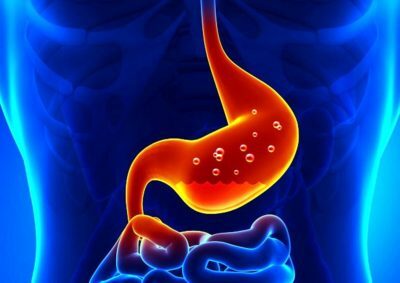1 The essence of the disease
Doctors believe that this condition is rather a transitional rather than an independent disease. Gradual modification of the stomach tissue occurs under the influence of prolonged exposure to adverse factors - alcohol, drugs or malnutrition. This is manifested primarily by the fact that the inflammatory process begins on the mucosa, which grows into a chronic process in the absence of the necessary therapy. Further, the cells of the stomach stop performing their function and atrophy, after which the process of metaplasia begins. The danger is that, in the absence of treatment, gastric metaplasia grows into dysplasia, which eventually degenerates into a cancerous tumor. Thus, intestinal metaplasia of the stomach can be considered a benign stage of such transformations. The process is completely reversible provided that the harmful effects of external factors and the necessary treatment are removed in a timely manner.

We recommend that you read the
- How to treat Helicobacter pylori
- How to take an analysis for Helicobacter pylori
- What is a pronounced pneumatosis
- Effective agent for gastritis and stomach ulcer
2 Origins of the development of the pathology
Factors affecting the occurrence of this process can be diverse:
- Most often intestinal metaplasiaoccurs due to chronic gastritis and peptic ulcer disease, which resulted from infection with the Helicobacter pylori bacteria. It is characteristic that both these diseases are extremely common among the population, while the patients themselves are extremely careless towards them.
- Another reason, no less common, is considered gastroesophageal reflux disease, in which the contents of the stomach are involuntarily thrown into the esophagus.
- The incompetence of the pyloric part of the stomach, when bile enters it, can also cause the development of intestinal metaplasia.
- Constant irritation of the mucosa under the influence of external factors.
- Hormonal disorders.
Infection with Helicobacter pylori almost always leads to the development of metaplasia of the stomach, and it is this that usually causes a further degeneration of the epithelium into cancer. This microorganism is a first-class carcinogen, and therefore it is so important to seek help from a specialist when the first signs of the disease occur and to identify in a timely manner possible infection with Helicobacter pylori.
-
 IMPORTANT TO KNOW! Gastritis? Ulcer? To have a stomach ulcer not turned into cancer, drink a glass. ..Read the article & gt; & gt;
IMPORTANT TO KNOW! Gastritis? Ulcer? To have a stomach ulcer not turned into cancer, drink a glass. ..Read the article & gt; & gt;
Stages of development of the disease:
- Intestinal metaplasia of the stomach of a weak character. In this case, the cells of the stomach are replaced by intestinal cells by less than 5%.
- The average form of lesion, when the cells are replaced by approximately 20%.
- A pronounced form when the organ is affected by more than 20%.
3 Diagnosed
The specificity of this disease is that it is not characterized by symptoms, and for this reason it is so difficult to identify it and start treatment on time. Symptoms of metaplasia are also characteristic for many other pathologies of the gastric mucosa. Therefore it is very important in case of the slightest suspicion of the development of metaplasia to go to a medical institution for the purpose of conducting a survey.

As a rule, the disease is detected in people by accident in the process of endoscopy as a result of going to the doctor for the treatment of other pathologies of the digestive tract. The patient has a pain in the stomach, which can be permanent or periodic, he suffers from periodically arising nausea and sour eructation, loses his appetite, and all these manifestations can be symptoms of metaplasia.
-
 Gastroenterologist. IMPORTANT: "I beg you, if you began to worry about abdominal pain, heartburn, nausea, do not do gas. .."Read more & gt; & gt;
Gastroenterologist. IMPORTANT: "I beg you, if you began to worry about abdominal pain, heartburn, nausea, do not do gas. .."Read more & gt; & gt;
4 Therapeutic tactics
Metaplasia of the stomach can be:
- Complete( small intestine), which occurs, as a rule, with such a disease as gastritis.
- Incomplete( colonic).It is this form that leads to the development of a cancerous tumor.
Metaplasia also happens:
- focal( there is a replacement of the glandular pyloric glands);
- diffuse( replacement of pyloric glands by the base);
- ciliary( occurrence in the stomach of cells, affecting the organ);
- pancreatic.

Treatment depends on the phase of the disease and its variety. Operative intervention is not always necessary. In the case of timely diagnosis of pathology, it is possible to localize the focus of its occurrence and achieve a positive result without surgery. Conservative treatment is to reduce the amount of acid cast in the esophagus of gastric contents.
If intestinal metaplasia has developed against a background of gastroesophageal reflux disease, treatment of this disease, which consists in reducing acid casts, helps stop the progression of pathology and prevents the development of a cancerous tumor. It must be remembered that the effect of acid on the mucous membrane, even in minimal amounts, can be fatal, and for this reason therapy must be intensive. As a rule, doctors prescribe medicines containing magnesium and aluminum salts.
ADVICE FROM THE MAIN GASTROENTEROLOGIST
Korotov SV: "I can recommend only one remedy for the rapid treatment of Ulcer and Gastritis, which is now recommended by the Ministry of Health. .." Read the reviews & gt; & gt;
In the case of gastric lesions of Helicobacter pylori infection, in addition to bacterial preparations and immune stimulants, antibacterial medicines are widely used. Conservative treatment should be carried out under the supervision of the attending physician. If there is no positive dynamics, the incomplete stage of metaplasia is diagnosed or there is a possibility of metaplasia re-birth into cancer, surgical intervention is indicated.

5 Recommended diet
Adherence to a properly selected diet plays an important role in the treatment of any disease of the gastrointestinal tract. Only when it is observed there is the possibility of obtaining a positive result. Dishes that the patient uses for food should not in any way irritate the cells of the mucous membrane of the stomach. Totally excluded are sharp, salty, acidic foods, smoked products and milk in its pure form, as well as pastries and white bread, canned food and pickled vegetables. Portions should be small, and you need to take food often. In the process of treatment, one should not eat immediately before going to bed, since the affected stomach mucosa should be allowed to rest at night. Cooking food is best in a double boiler and consumed in a warm form.
WE RECOMMEND!
For prevention and treatment of gastrointestinal diseases our readers advise Monastic tea. This unique remedy consists of 9 medicinal herbs useful for digestion, which not only supplement, but also strengthen each other's actions. Monastic tea will not only eliminate all symptoms of the gastrointestinal tract and digestive system, but will also permanently eliminate the cause of its occurrence.
Opinion of doctors. .. »
As for folk methods of treatment, their use is not recommended, since they can not cure the disease, but only eliminate certain symptoms of it, postponing the visit to a specialist.
6 Preventative measures
Prevention of this dangerous pathology is simple enough:
- Try to avoid stress situations whenever possible. This recommendation is one of the main, because the stomach, as a rule, quite acutely reacts to the systematic manifestation of any negative emotions. This is due to the fact that this organ contains a huge amount of nerve fibers.
- Maintain hygiene. As a result of violation of the norms of hygiene, any infection, including the Helicobacter pylori, which provokes metaplasia of the stomach, can enter the body.
- Follow a strict diet. This will help not only to prevent the development of intestinal metaplasia, but also to avoid many other diseases of the gastrointestinal tract. To products, the use of which should be moderate, are: carbonated drinks, smoked products, sharp, salted and refined dishes. Various cereals, bread, vegetables and fruits must be included in the diet.
- Refuse from the use of harmful substances or at least limit the amount of their intake into the body. Both alcohol and nicotine have a detrimental effect on the gastric mucosa, leading to the development of oncology.
Remember that these simple recommendations can not be neglected. The consequences can be fatal. That is why, when the slightest manifestations appear, signaling the possible development of metaplasia of the stomach, you need to seek help from a specialist as soon as possible.
- 1 The essence of the disease
- 2 The origins of the pathology
- 3 Diagnosis
- 4 Therapeutic tactic
- 5 The recommended diet
- 6 Preventive measures
Metastasis of the stomach is a very serious disease, which is a pathology, during which, as a result of the influence of unfavorable factors, specific cells of the gastric epithelium are damaged, which after a certain time are replaced by other cells. As a rule, at the site of atrophy there are cells of the intestine - thin or thick. As a result of this substitution, the stomach stops working, as the intestinal cells begin to perform their characteristic function.
Do you have gastritis?
GALINA SAVINA: "How easy is it to cure gastritis at home for 1 month. A proven method is to write down a recipe. ..!"Read more & gt; & gt;



